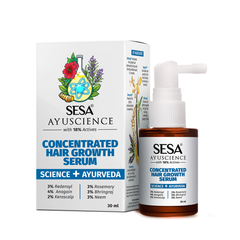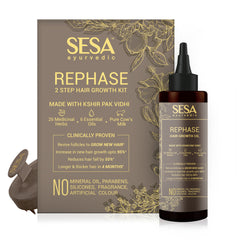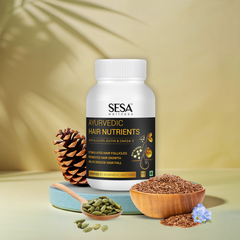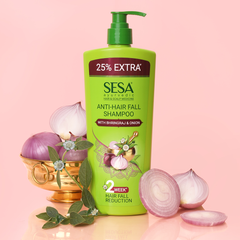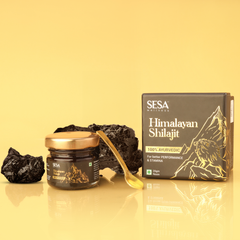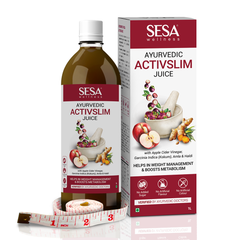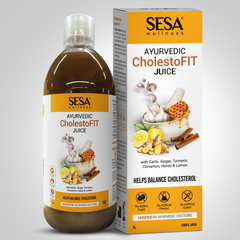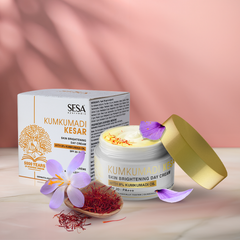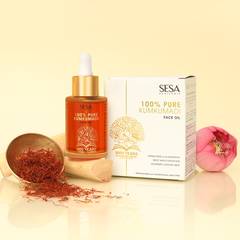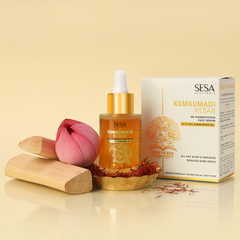Pregnancy is like a roller coaster ride; filled with a number of highs and lows. While you bask in the happiness of your baby’s firsts, the lows like lack of sleep, frequent mood swings and changes in the skin take a toll on you. New moms are often unaware of the excessive hair loss that accompanies child birth. They get stressed when they see chunks of hair blocking the drain. However, this hair loss is completely normal. More apparent in the moms with long hair, postpartum hair loss is fairly common. This temporary excessive hair loss reaches its peak at about 4 months after the delivery. The hair returns to its normal density by the time the child turns one and, in some cases, even earlier. If it has been more than a year since your delivery and the hair has still not returned to normalcy then it is advisable to contact your healthcare provider as it could be a sign of underlying conditions such as anemia and thyroid.
Why does hair loss occur in new moms?

All hair on the body grows in phases; the growth phase, the resting phase, the transition phase, and the shedding phase. Usually about 85 to 95 percent of the hair on one’s head is in the growing stage while the other 5 to 15 percent is in a resting stage. After the resting period is completed, the hair begins to fall out with brushing and shampooing being the most common avenues. Then they are replaced by new hair. However, at the time of pregnancy, high levels of estrogen lead to a prolonged growing stage. As a result, fewer hair are in the resting stage and the shedding declines dramatically. Due to this most women enjoy thick, luscious, and shiny hair throughout their pregnancy. After the woman has given birth the estrogen levels decrease and a huge amount of hair follicles enter the resting stage, essentially making up for the lost time, and begin to shed excessively about 3-4 months into the delivery. An average woman loses around 100 hair strands a day but a new mom can lose up to 400 hair strands daily.
So although postpartum hair loss cannot be avoided, there are a few things you can do to speed up the growth process and return the hair to its former glory. Using the knowledge of the Charaka Samhita, an ancient text written around 1000 BC, we have come up with top ten remedies for hair loss that will allow new moms to swiftly breeze through this sensitive and vulnerable period.
1. Watch the balance!
We are well aware of the pre-pregnancy cravings that moms-to-be struggle with, but what is less known is that sometimes these cravings can bug them post the delivery too. So, it is important to eat a well-balanced and nutritious diet to make sure your body regains its strength. The best way to do this is to incorporate various fruits, vegetables and berries complemented with healthy proteins like biotin in your diet. Foods known to improve the health of hair are dark leafy greens such as spinach as they provide iron and vitamin C, sweet potatoes, carrots as they provide the beta carotene, eggs for the vitamin D and seafood like fatty fish, shrimps, oysters for omega-3s and magnesium. Foods rich in antioxidants like beets, beans, kale, red cabbage provide excellent protection to hair follicles. Some other rich food items that are appropriate are nuts, flax seeds, and soya products.
What to avoid: Excess salt, too much Alkaline/Acidic food intake, improper portions, and mealtimes
What to keep: Equilibrium of 6 ‘Rasas’ in your food: Madhura (Sweet), Amla (Sour), Lavana (Saline/Pungent), Katuka (Bitter), Tikta (Spicy), Kasaya (Astringent).
Too much of any of these and the balance is lost! Keep a check on the amount of junk food, pickles, spicy food, dairy, and salty processed food you are consuming.
Don’t forget that staying hydrated is just as vital, so make it a point to reach your daily water consumption goal!
2. Take your vitamins
Vitamins are not only helpful in maintaining overall health but they also prevent hair loss. While vitamins are essential, they should not be a substitute for a balanced diet, especially since breastfeeding while caring for a little baby can be quite taxing. Vitamins are beneficial when taken in addition to a well-maintained healthy diet. Continuing your prenatal vitamins after your baby is born is often recommended. Ayurvedic juices are considered to be one of the best options these days, as they are 100% safe with no side effects. Sesa Ayurvedic Hair Care Juice for New Moms is a new product specially formulated for new moms that helps with the necessary requirements to fight hair fall and reduce postpartum symptoms.
However, vitamin supplements should only be consumed after consulting with your healthcare provider. Once you get a heads up, taking multivitamin or a biotin supplement can be a good starting point as they boost hair growth and strengthen weak and dull locks of hair. The American Pregnancy Association recommends consuming Vitamin B complex and/or biotin (B7), Iron, Vitamin C, Vitamin E and Zinc.
3. Keep your stress levels in check
Giving birth is strenuous and stressful. The stress does not magically vanish after the baby is born but only increases tenfold. Unfortunately stress is one of the major reasons for hair loss. While we cannot suggest that you avoid stress, we can help you with some quick tips and tricks to keep it in check. Practicing meditation and mind exercises are some effective ways to help your body relax and thereby regulate hormonal imbalance. Simply meditating for a couple of minutes per day will prove to be beneficial for relaxation of your mind. We recommend doing it before you sleep at night when you reflect on the entire day that has passed simply as an observer without judging yourself for anything. You are up for a surprise with the kind of insights you will get for the next day with this method. Reducing screen time and considering writing your feelings down on paper instead of bottling them up can also be a good step in this direction. We also suggest taking small breaks in between to give yourself a breather. You can use those few minutes to do things that might help you recharge and reinvigorate like splashing your face with water, watching or listening to something relaxing or simply taking a power nap.
Remember, asking friends and family members to help take care of the baby when you feel overwhelmed does not make you a bad mom. Both the baby’s and the mother’s peace are essential for an enriching experience.
4. Massage your hair regularly
Massaging hair with a good quality organic hair oil should be an unmissable part of your post pregnancy hair care regimen. Oils like coconut, almond, castor, olive, and sesame are beneficial for new moms. Warming the oils moderately before applying is advisable as lukewarm oil permeates deeper into the scalp. You can always skip the warming of oil step with Sesa Onion Hair Oil with Bhringraj which is made using pure cold pressed oils, onion, bhringraj and curry leaves. After oiling, wrap a wet hot towel on your head for a few minutes and then shampoo your hair. This should be done 2-3 times a week regularly for at least three months to get the best results. Apart from massaging your hair regularly, one daily regimen prescribed in Indian Ayurvedic Science involving postpartum care is “Tailabhyanga” which means full body oil massage!
5. Select the correct skin and hair care products
Being mindful about the kind of products that you use on a day-to-day basis to maintain personal hygiene goes a long way to ensure better health prospects. Hair-fall and skin problems are amongst the few obvious and sometimes quite drastic consequences of postpartum condition. Educating yourself on ingredients that go in the commonly used products in your personal care is encouraged. Don’t use a lot of leave on skin hair care applications until the baby is dependent on you. Avoid "conditioning shampoos" and “intensive conditioners" as such products weigh down your hair and make them look limp. It is advisable to try "volumizing shampoos" as they make the hair appear fuller, denser, and more lustrous. Add a conditioner made for fine hair to your regimen as they contain ingredients that don’t weigh down hair. It is important to pick shampoos which are Natural/Ayurvedic, herb-based as they effectively clean, nourishe the scalp and have a lower irritation potential. Sesa offers products like our Sesa Onion Shampoo and Conditioners with the goodness of Reetha and Shikakai that are natural. Make it a point to steer clear of shampoos that contain harmful chemicals like parabens, sulphates and silicones and always remember to check the label before purchasing. Remember to conduct a patch test without fail if you are trying on a new product.
You don't always have to run to the nearest store to get the hair care products; you will find some right inside your home.
6. Fenugreek & Curd
Fenugreek seeds are rich in two nutrients which are essential for hair growth i.e., iron and protein. These seeds have a unique composition of plant compounds which presumably induce hair growth attributing to their anti-inflammatory and antifungal properties. Hence fenugreek is helpful in combating hair loss during pregnancy. To reap its benefits, soak a few fenugreek seeds in a bowl of water overnight. The next day apply the fenugreek infused water to the scalp and leave for a couple of hours. Then shampoo your hair. Repeat this remedy two-three times a week to see visible results. Another way can be grinding the soaked fenugreek seeds into a paste, applying it on the roots and washing it off after 20 mins or so. It gives amazing results.
Curd is rich in protein, calcium and also provides potassium, magnesium, and vitamin A. While you can incorporate curd into a balanced diet to get its nutrients that will ultimately reflect on your hair, you can also apply curd directly to your scalp. This treats dry scalp conditions like dandruff more directly. Curd helps soften and strengthen the cuticle. One of the many benefits of curd is that it is an excellent conditioner for the hair. Massaging the scalp with curd strengthens the hair follicles and helps them regain their lost shine. Apply once or twice a week and leave for 15 minutes. Rinse & shampoo thoroughly.
7. Treat your hair gently and avoid styling
Brushing the hair in a harsh manner causes it to fall out in big chunks so it is advisable to brush it only once a day and be very gentle while doing it. Do not use fancy styling products, hair dyes, chemical treatments, and chemical sprays while your hair is shedding excessively. Always use a comb which has wide bristles and avoid brushing through hair while it is wet. Using hair straightening or curling iron might make your hair look even thinner. It is best to let your hair air dry until it returns to its original density and shine. Stay away from hairstyles like tight braids that put tension on your scalp. Instead of using rubber bands to tie hair, use scrunchies or barrettes.
8. Hair masks and body scrubs
Including natural, homemade, and chemical free hair masks in your routine will prove to be beneficial. To make this hair mask take a well mashed avocado, add a tablespoon of coconut milk, and then mix it well. Apply on the scalp and leave it to dry. Wash it off with a natural hair shampoo. This combo is highly advantageous. Avocados are rich in vitamins and boost collagen production while coconut milk has the goodness of protein which is essential for proper hair growth. For the body mask use a mixture of gram flour + milk to scrub and moisturize your skin before bath and after “tailabhyanga.” It will keep your skin protected from dryness and allied problems.
9. Get a new haircut!
You can also consider shortening your hair length by a few inches so that you can style it more easily and the hair loss becomes less noticeable. With your life revolving around the new-born your me time is bound to decrease dramatically so a shorter length will be considerably easier to manage.
10. It's not all about the hair — The 7 wonders
The consumption of ayurvedic herbs in the postpartum phase is beneficial for the mother to recover to a normal body, cope with hormonal changes, support the baby with milk production and build the much needed immunity, strength, and stamina. We recommend including the following Ayurvedic herbs in your diet on a regular basis.
1. Amla (age sustainer, anti-allergic)
2. Shatavari (supports the uterus, builds strength)
3. Ashwagandha (strength building, improves immunity)
4. Haritaki (anti-dermatosis, anti-bilious and antioxidant)
5. Shankpushpi (mildly laxative, rejuvenating, improves memory)
6. Turmeric (anti-fungal, anti-inflammatory)
7. Bhringraj (promotes hair health, aids in sleeping)
These act as ‘Rasayana for pregnant and lactating women’ per Ayurveda. You may seek medical advice to optimize the dosage and form on the basis of your specific conditions.

Keeping in mind how hard pregnancy can be on new moms, we at Sesa have tried to make your journey a little bit easier! In doing so we have meticulously crafted an Ayurvedic Hair Care Juice For New Moms – Sesa Care using the wisdom of the centuries old vedas. Our juice is a rich blend of ayurvedic ingredients like Amla, Shatavari, Ashwagandha, and Jatamansi that help
boost the strength and immunity of new moms and keep the postpartum hair fall in check.
STILL A BIT CONFUSED? CHECK THIS OUT!

You can now book a free online consultation with an Ayurvedic doctor on www.sesacare.com and get all your confusions sorted. And the best part? You get unlimited follow ups!












